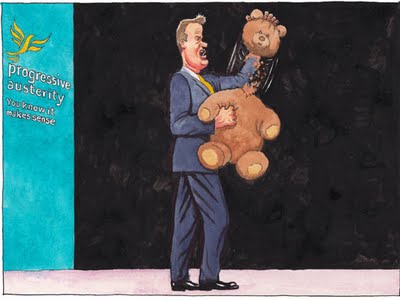A very underwhelming conference.
 As conferences go, the Liberal Democrats' visit to Bournemouth was not exactly a resounding success. To be sure, as Martin Kettle suggests, anything that brings the party to wider public attention, however fleeting, helps. When 60% don't know who Nick Clegg is, according to a Newsnight poll, a figure which probably suits him down to the ground, you have to hope instead that it's your policies rather than your personality that makes the waves.
As conferences go, the Liberal Democrats' visit to Bournemouth was not exactly a resounding success. To be sure, as Martin Kettle suggests, anything that brings the party to wider public attention, however fleeting, helps. When 60% don't know who Nick Clegg is, according to a Newsnight poll, a figure which probably suits him down to the ground, you have to hope instead that it's your policies rather than your personality that makes the waves.It was those policies, naturally, which came just as unstuck as both Clegg and Vince Cable did over the week. It's understandable when we're still either eight or nine months away from the election and when the political theme of the moment is how to get the deficit down with the smallest amount of pain, but surely Clegg and co realised that talking of "savage cuts" to the Guardian wasn't going to go down well? To then increase the pain by taking the sacred cow of abolishing tuition fees and downgrading it to an "aspiration" was surely asking for trouble, or as much trouble as the staid bunch of yellowshirts can manage, which, predictably, was a letter to the self-same Graun.
The standard defence of this rather amicable difference of opinion within the party is that the Liberals are the only remaining of the main three parties which actually decides its policies at conference democratically. This doesn't however explain the bewildering failure of either Clegg or Cable to inform Julia Goldsworthy of the new "mansion tax" policy, despite it firmly being her turf, nor does it then help us to understand why the party didn't know how it was actually meant to work. This wouldn't perhaps be unusual when it comes to either the government or the opposition, responding to a headline with a policy drawn up on the back of the proverbial cigarette packet or dinner napkin, with the details to follow later, but this was the party that usually has it all worked out in advance.
Part of the reason seems to be down to Clegg and Cable thinking that they can run the party as their own fiefdom, buoyed by their overwhelming popularity. You can hardly blame dear old Vince for some of the hype going to his head, but Clegg has hardly done anything to justify such delusions of grandeur. Last year Clegg's closing speech was underwhelming; this year it was completely dismal. To call it a speech might even be awarding it an adjective it doesn't deserve, as Clegg seemed to take the very worst tendencies which overwhelmed the utterances of Tony Blair, such as beginning a new paragraph when he was only starting the next sentence as well as the vacuity of the seemingly endless statements of facts and pseudo-beliefs, and combining it with the personal feel that David Cameron attempts to emulate and dismally fails to. Hence Nick wants to be prime minister, not like the Tories because they believe that they're entitled to it as their time has come again, but because he's on our side, not the side of the "others". When it comes to platitudes made to seem inspiring, wanting to be on the side of the weak rather than the strong is not exactly stirring stuff.
When attacking Labour, especially accusing them of betraying the best hopes of a generation, there was some power in amongst the placidness, but it was few and far between. Easily the worst combination, already being much mocked, was Clegg's espousal of a "progressive austerity". When Cameron and Osborne talk of austerity, it sticks in the craw because you know that not once in their entire lives have they had to experience anything approaching "austerity", yet they delight and seem almost excited at imposing it upon the country. Clegg somehow imagines that by cloaking this austerity in the verbiage of wonky ideology that we won't notice that he in fact seems to be telling us that he was to makes things, err, progressively worse. It's perhaps not the greatest example, but an Alastair Campbell would have seen that nonsense on stilts in the text and sliced it out in a second. Clegg instead just ended up looking like a flatulent prat.
This has less to do with the Liberal Democrats not being a serious alternative, and more to do with the electoral reality which makes them look not a serious alternative. Yet this week should have helped to cement the deal with those flirting with the party, while those paying attention will have likely only been further confused. We used to know what the Lib Dems stood for, just as we used to know what Labour and the Conservatives stand for; no longer. They remain the best, most viable alternative to the apparent foregone conclusion which is a Conservative electoral victory, but they seem to be going out of their way to lose votes rather than win them.
Labels: conference season, Liberal Democrats, Nick Clegg, policy, politics, Vince Cable


As it stands, the Lib Dems have lost my vote.
Posted by claude |
Friday, September 25, 2009 12:55:00 PM
claude |
Friday, September 25, 2009 12:55:00 PM
When 50% think Gordon Brown is the crumpled looking Scot who plays Rebus what chance has Nick Clegg got?
Gordon 4 Obama True
Posted by Ian R. Thorpe |
Friday, September 25, 2009 8:22:00 PM
Ian R. Thorpe |
Friday, September 25, 2009 8:22:00 PM